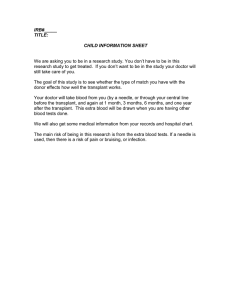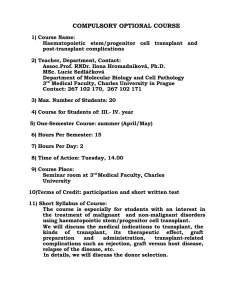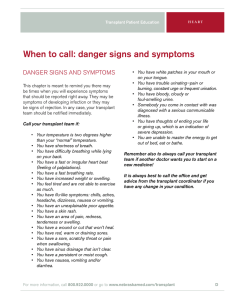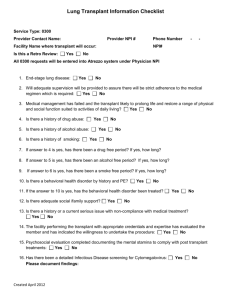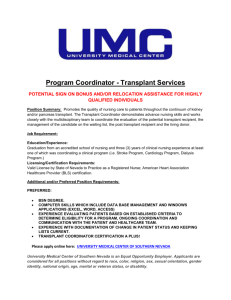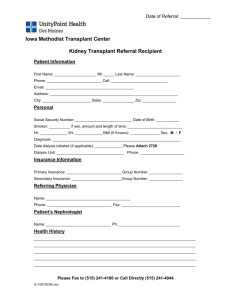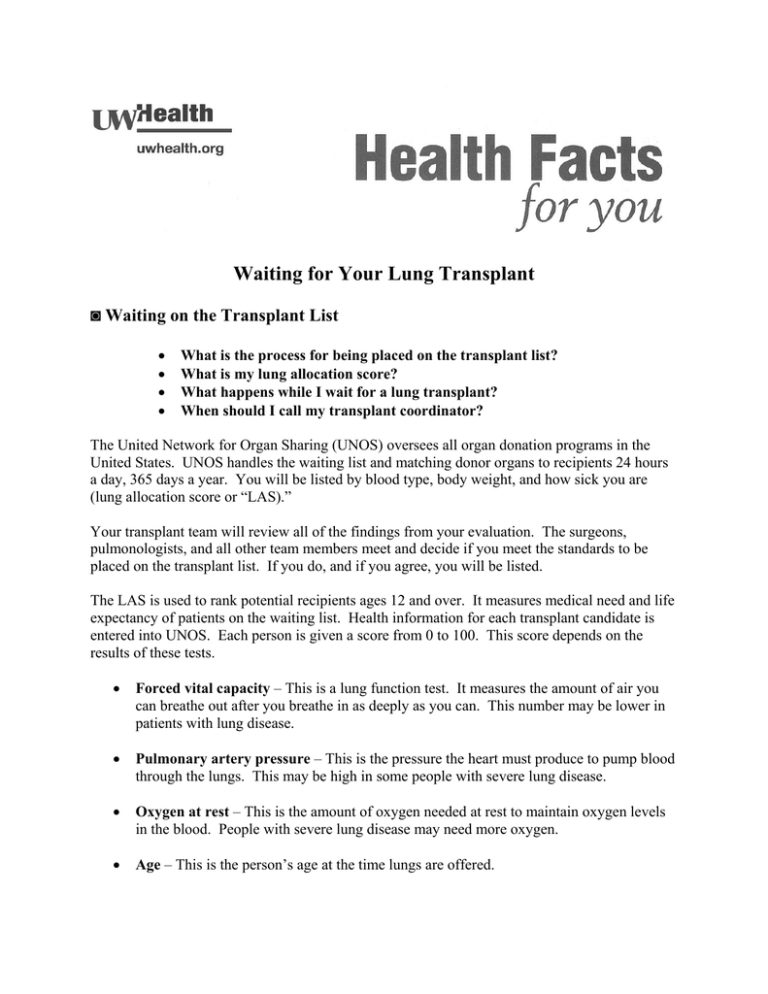
Waiting for Your Lung Transplant
◙ Waiting on the Transplant List
What is the process for being placed on the transplant list?
What is my lung allocation score?
What happens while I wait for a lung transplant?
When should I call my transplant coordinator?
The United Network for Organ Sharing (UNOS) oversees all organ donation programs in the
United States. UNOS handles the waiting list and matching donor organs to recipients 24 hours
a day, 365 days a year. You will be listed by blood type, body weight, and how sick you are
(lung allocation score or “LAS).”
Your transplant team will review all of the findings from your evaluation. The surgeons,
pulmonologists, and all other team members meet and decide if you meet the standards to be
placed on the transplant list. If you do, and if you agree, you will be listed.
The LAS is used to rank potential recipients ages 12 and over. It measures medical need and life
expectancy of patients on the waiting list. Health information for each transplant candidate is
entered into UNOS. Each person is given a score from 0 to 100. This score depends on the
results of these tests.
Forced vital capacity – This is a lung function test. It measures the amount of air you
can breathe out after you breathe in as deeply as you can. This number may be lower in
patients with lung disease.
Pulmonary artery pressure – This is the pressure the heart must produce to pump blood
through the lungs. This may be high in some people with severe lung disease.
Oxygen at rest – This is the amount of oxygen needed at rest to maintain oxygen levels
in the blood. People with severe lung disease may need more oxygen.
Age – This is the person’s age at the time lungs are offered.
Body mass index – BMI is a ratio of a person’s weight to height. When used with other
test results, it helps to assess health status.
Diabetes – This may predict future problems in some people with lung disease.
Functional status – The New York Heart Association’s ratings measure how a person’s
lung disease affects their ability to function in daily life.
6-minute walk distance – In the 6-minute walk test, patients are asked to walk as far as
they can in 6 minutes. The distance walked is a measure of how well you can manage
your daily life.
Assisted ventilation – The use of a ventilator, BiPAP, or CPAP to assist breathing may
be a measure of how severe the disease is and may affect success after a transplant.
Pulmonary capillary wedge pressure (PCW or “Wedge Pressure”) - Blood that returns
to the heart from the lungs must get by this pressure. This can become higher when the
heart is not pumping as well as it could.
Serum creatinine – This measures how well your kidneys work. High creatinine levels
reflect impaired kidney function.
Diagnosis – Research has shown that urgency among people needing a lung transplant
and success after a lung transplant varies among people with different lung diseases.
The LAS may change daily due to age and other factors that affect how well-matched the donor
and the recipient are. Because the LAS changes daily, we do not provide the LAS to patients.
Your score can be revised if your health status changes.
Status 7 is for patients who are not candidates for transplant at the moment, but may need one in
the future.
While on the wait list, you will be seen in the Lung Transplant Clinic every 3-6 months. We will
update your LAS with each visit. Follow-up testing and a teaching session will be done to help
you prepare for transplant. It is helpful to bring a family member or friend with you to your
visits. It is vital that you call your transplant coordinator or a member of the transplant team if
there is a change in your health status or how well you can function. Be sure to call if you
Start a course of antibiotics.
Are transfused with blood or blood products.
Are hospitalized.
Have a major change in your health status.
If there is a major change in your health status, we will update your LAS and the lung transplant
team will want to schedule you to be seen in the Lung Transplant Clinic.
Always follow the instructions given to you by your local doctor or the transplant team.
2
Waiting on the transplant list can be stressful for you, your family, and friends. Be sure that you
talk with your support people about your clinic visits, your health status, and your plans.
Your local pulmonologist will stay involved in your care before and after you receive a lung
transplant. Be sure that you let your coordinator know if your local pulmonologist makes
changes in your medicines.
◙ Intro to Medicines
What types of medicines will I need to take and why?
Will there be side effects from them?
How will I pay for them?
After your lung transplant you will be on many kinds of medicine each day, such as
Medicines that prevent rejection (anti-rejection). You will take these for the rest of your
life.
Medicines that prevent infection (anti-infective). You may take these for the rest of your
life.
Supplemental medicines. These may include vitamins and medicines to control your
blood pressure or cholesterol.
It is vital that you take all the medicines ordered by your transplant team.
There can be many side effects caused by the medicines you will be taking. These can include
Diabetes
High cholesterol
High blood pressure
Weight gain
Tremors
Mood changes
Headache
Nausea
Diarrhea
Medicines can be given to help with some of the side effects. Other side effects may improve
over time. It can be very hard to cope with the new medicines, side effects, and lifestyle
changes. You should never stop a medicine or change a dose without talking with your
transplant team.
Be sure to talk with the financial counselor and social worker about medicine coverage after
transplant. These medicines are very costly. You will want to have a plan to cover the costs in
case your insurance does not.
3
◙ Financial Planning
What do I need from my insurance company to plan for a transplant?
What questions about finances do I need to have answered?
As you get ready for transplant, you will need to learn more about your insurance plan.
▪
Transplant patients are required to take medicines for the rest of their lives. In fact, you may
need over 15 different transplant drugs. As a result, you must learn now about your drug copays or deductibles.
▪
Know your co-pays and deductibles for clinic visits and procedures. Transplant patients
receive lifelong follow-up care. Knowing your co-pays and deductibles will ensure that you
are prepared to budget for this expense.
▪
Many plans have a yearly limit for co-pays or deductibles. Once you have reached the
limit, your insurance may pay 100%. To know your plan, refer to your insurance booklet and
keep track of your healthcare expenses.
▪
Contact your insurance agent to find out how much you have left before you reach your
lifetime and transplant limits. This helps you to plan for secondary coverage or other
options to cover any further expense. Once you reach the limit, insurance will not cover any
further expense. Transplant patients often reach their limit.
▪
Know the referral guidelines of your health plan. UWHC is a hospital-based clinic. You
will get separate bills from the hospital and the doctors for their services. If you fail to
follow the guidelines, you may need to pay for the cost of a service which may have been
covered.
▪
You may need to stay in Madison for some time after your transplant. Since most
insurance plans require patients to only fill prescriptions in certain drugstores, know where
you can get them filled both in your hometown and in Madison. Plan ahead for monthly bills
as well.
Once you have received your benefit summary from the financial coordinator, you may have
even more questions. Below are some common questions which other transplant patients have
found helpful.
▪
▪
▪
What would be my monthly total co-pay if I were prescribed 15 medicines?
What are the co-pays and deductibles for clinic visits and procedures that I need to pay out of
pocket?
How would this expense fit into my budget?
15 X $_____ (the co-pay amount per prescription) = $_____
Monthly clinic and procedure co-pays: $________________
4
▪
My lifetime insurance maximum is: ______. How will I obtain coverage if I reach my
lifetime max?
▪
What would I do if my insurance was changed or dropped? Call a financial coordinator
and tell your transplant coordinator right away!
My health plan referral guidelines
____________________________________________________________________________
____________________________________________________________________________
____________________________________________________________________________
It is also vital to understand how Medicare may affect your transplant. Review your Medicare
benefits handbook for more complete information. If you have Medicare and other health
insurance coverage and have questions about who should pay first, check with your insurance
company or your Medicare coordination of benefits contractor at 800.999.1118.
Lung transplant will be a covered cost under Medicare part A (inpatient hospitalization).
However, patients are responsible for a deductible of about $992.00. This may change
every year. You are responsible for paying the deductible if you do not have a
supplemental insurance plan to Medicare or alternative insurance coverage.
Patients enrolled in Medicare part B have outpatient clinic benefits that will pay for 80%
of costs for:
o Doctor’s services
o “Special Practitioner” services
o Home Health services, ambulance services (if medically needed)
o other items such as outpatient testing, diagnostic tests, and labs
For a complete listing, review your Medicare benefits handbook. Patients are responsible
for paying the portion not covered by Medicare if they do not have a supplemental
insurance plan or alternative insurance coverage.
Medicare part D Prescription Drug Plan (PDP) varies for each person.
o If a transplant patient has Medicare B at the time of his transplant, Medicare B pays
for 80% of the cost of immunosuppressant and antiretroviral medicines. Patients are
then responsible for the remainder of the cost if they do not have a medicine benefit
from their supplemental insurance plan or an alternative insurance coverage.
Medicare D will NOT cover any cost related to the immunosuppressant or
antiretroviral medicines if a patient had Medicare B at the time of his transplant. You
will need to check with your Medicare D PDP to figure out what medicines they will
cover. Each plan is different so be careful in choosing the best plan to fit your needs.
o If a transplant patient does not have Medicare B at the time of the transplant,
Medicare D will cover some of the cost of the immunosuppressant and antiretroviral
medicine. Patients still need to be aware of the “doughnut hole” and how that will
affect their medicine costs.
o Be careful in choosing your Medicare D PDP as you will need to purchase medicines
in the Madison area as well as in your hometown if you need to stay here after
transplant.
o The hospital financial planner or social worker will be able to answer questions you
have about Medicare.
5
◙ The Call
How will I be reached?
What do I need to have ready ahead of time?
What will happen after I get the call?
Once you are listed for a lung transplant, we must be able to reach you at all times. You must
inform your transplant coordinator if you are going to be out of the area or can’t be reached for any
reason. You must always have a cell phone or pager with you. Be sure your phone or pager is
always on and fully charged.
The transplant coordinator will call you if an organ that may be a match for you becomes
available. At this time you will be asked
To stop eating and drinking.
About your current health status.
To keep a phone line open, but to wait at home until you are called again OR to come to
UW Hospital.
You will need to bring your insurance information and a list of your medicines when you come
to the hospital. You do not need to bring other items. It is a good idea to leave all jewelry and
other items of value at home.
The transplant coordinator will prepare for ambulance or air service to get you to the hospital.
They will do this based on the plan that was set up when you were first listed for transplant. If
you live nearby, you may already have a friend or family member who is prepared to bring you
in. You should not drive alone when you are coming for a transplant.
The transplant coordinator will tell you where to report when you get to the hospital. Keep in
mind that your transplant could be cancelled at any time.
It is vital that family and friends are part of the planning process. Be sure that they are aware of
the need for you to be reached at all times. They should also know the plan for getting you to the
hospital when needed.
Once you arrive, you will be very busy getting ready for your transplant. This will include
Signing consent forms.
Having blood drawn.
Washing your chest and abdomen.
Getting a chest x-ray.
Having an IV line placed.
You may be given medicine to help you relax during this time.
6
◙ Advance Directives
What is a Power of Attorney?
What is a Living Will?
How do I fill these out?
We strongly urge all patients over 18 years of age to complete a Power of Attorney for Health
Care. This is not the same as a Living Will. It tells us who you want to direct your health care if
you are not able to speak for yourself. These people should know your wishes about medical
care. They will make choices based on your requests. Any special health care wishes you have
should be written down on this form. You are the only person who can complete this form.
The person named as your health care agent would not be able to make choices for you right
away. Two doctors or a doctor and a psychologist would have to first sign an incapacity
statement to put your Power of Attorney for Health Care into effect. This would state that you
are not able to be given and understand health care information or to share your health care
wishes. When you are able to make your own health care decisions again, the Power of Attorney
for Health Care will no longer be active, but it remains valid in the event you become
incapacitated again.
A Living Will lists some of your end-of-life wishes. It does not allow you to choose a person to
make decisions on your behalf.
Your social worker can help you fill out and sign these forms. We provide this service to
patients free of charge.
◙ Family Support
What resources are available for my family members?
How can family members stay updated on my status?
Waiting for lung transplant can be very tough for a patient’s family members. Many of them are
anxious during this waiting period. There are many things that can be done to ease concerns.
They include
Talking about hopes and fears about the transplant.
Talking about the patient’s wishes in regards to Advance Directives.
Going to transplant support groups
Talking with a counselor.
Your transplant social worker can help you find resources where you live.
At the time of transplant, family members will be taken to a waiting area. The nursing staff will
provide updates every couple of hours during the transplant. Family members will be able to
make a short visit to the intensive care unit after the transplant.
7
It is best to choose one family member as the main contact. This person can leave a cell phone
number with the nursing staff so he or she can be called if needed. This person can update other
family members and friends about your status.
There may be family and friends who wish to send flowers. Fresh flowers and live plants are not
allowed in the rooms of transplant patients. Mylar balloons are a nice option.
◙ Resources for Transplant Patients
One-on-one conversations with UWHC patients who have had a transplant can be arranged. Call
the Lung Transplant Office at (608) 265-5658 if you would like this arranged.
Lung Transplant Support Groups
For information and meeting times, contact Khanh Oberley at (608) 219-9328.
Internet Resources
University of Wisconsin Hospital and Clinics Transplant information –
http://www.surgery.wisc.edu – Patients, Organ Transplantation
http://www.uwhealth.org – General health information
Pre & post-transplant support group information:
http://www.transweb.org/reference/maps/sg_state_summary.html
General transplant information: http://www.unos.org
General transplant information: http://www.transweb.org
National Transplant Society: http://www.organdonor.org
TransWeb: http://www.transweb.org
TRIO: http://www.trioweb.org
8
Important Phone Numbers
Lung Transplant Office
Toll-free
(Monday through Friday, 8:00am-4:30pm)
Fax
(608) 265-5658
(888) 522-2501
G7/105 Transplant Clinic
Nursing Staff-Cardiothoracic Surgery Unit
(608) 262-5420
(608) 263-8720
Lung Transplant Social Worker
Patient Housing
Financial Advisor
A-G
H-O
P-Z
(608) 890-9209
(608) 263-0315
(608) 263-1503
(608) 263-1505
(608) 263-1502
(608) 263-0597
In a medical EMERGENCY, proceed to the nearest emergency room or call 911.
The UW Hospital paging operator
(608) 262-0486
When you call this number be sure to
Call this number after 4:30pm and on weekends and holidays for emergencies only.
Tell the operator you are a lung transplant patient.
Ask for the cardio-pulmonary transplant coordinator on call.
Give your name and phone number with the area code.
If you do not hear from someone in 20 minutes, call back.
Your Transplant Coordinator
(608) 265-5658
For questions, prescription refills or other problems, please call and ask for your coordinator by
name Monday through Friday, 8am-4:30pm. Please reserve the “after business hours” calls for
urgent calls only. Prescriptions will only be filled during business hours, so please keep close
track of your medicines.
Copyright © 4/2013. University of Wisconsin Hospital and Clinics Authority. All rights reserved. Produced by the
Department of Nursing. HF#6679
9

